人教版八下现在完成时精讲精练学案设计(无答案)
- 格式:docx
- 大小:19.64 KB
- 文档页数:10
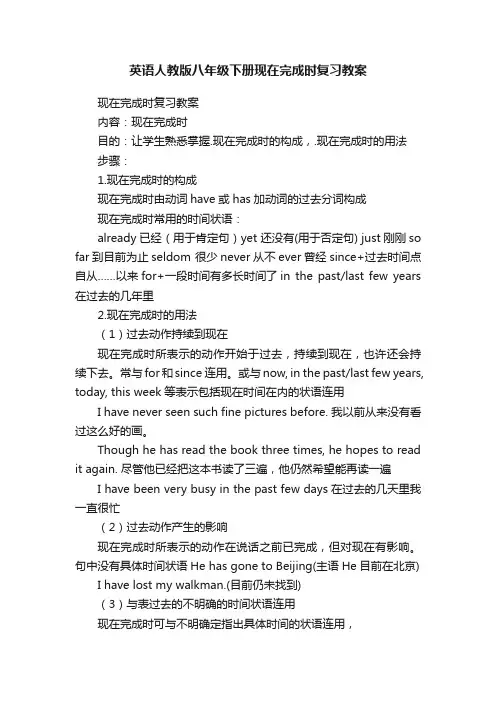
英语人教版八年级下册现在完成时复习教案现在完成时复习教案内容:现在完成时目的:让学生熟悉掌握.现在完成时的构成,.现在完成时的用法步骤:1.现在完成时的构成现在完成时由动词have或has加动词的过去分词构成现在完成时常用的时间状语:already已经(用于肯定句)yet 还没有(用于否定句) just刚刚so far到目前为止seldom 很少never从不ever曾经since+过去时间点自从……以来for+一段时间有多长时间了in the past/last few years 在过去的几年里2.现在完成时的用法(1)过去动作持续到现在现在完成时所表示的动作开始于过去,持续到现在,也许还会持续下去。
常与for和since 连用。
或与now, in the past/last few years, today, this week等表示包括现在时间在内的状语连用I have never seen such fine pictures before. 我以前从来没有看过这么好的画。
Though he has read the book three times, he hopes to read it again. 尽管他已经把这本书读了三遍,他仍然希望能再读一遍I have been very busy in the past few days在过去的几天里我一直很忙(2)过去动作产生的影响现在完成时所表示的动作在说话之前已完成,但对现在有影响。
句中没有具体时间状语He has gone to Beijing(主语He目前在北京)I have lost my walkman.(目前仍未找到)(3)与表过去的不明确的时间状语连用现在完成时可与不明确定指出具体时间的状语连用,如already, yet, just, before, recently, lately等He has already had his lunch他已经吃完午饭了I haven’t seen much of him recently我近来很少见到他(4)正确使用for和since表示短暂动作的词(如:come,buy, die, go, join, marry等)的完成时不能与for、since等表示一段时间的状语连用I have bought a house for six years(错误)I have bought a house(正确)I bought a house six years ago.(正确)I have had the house for six years(正确)He has joined the army since he graduated from school(错误)He has joined the army(正确)He joined the army two years ago(正确)He has been in the army for two years(正确)表示短暂动作的动词在进行如下转换后才可用于表示一段时间的完成时态借:borrow - has/have kept买:buy - has/have had感冒:catch a cold - has/have a cold死:die - has/have been dead入睡:fall asleep - has/have been asleep病倒:fall ill - has/have been ll参加:join - has/have been in离开:leave - has/have been away结婚:marry - has/have been married开始:start - be on这本书他已借了四天了He has borrowed this book for four days ( )He has kept this book for four days ( )自从杰克从伦敦回来他就病倒了Jack has fallen ill since he came back from London( )Jack has been ill since he came back from London( )戏已经开演半个小时了The play has started for half an hour( )The play has been on for half an hour( )2.现在完成时用于下面2个句型中①在有序数词及the only 构成的这一句型中,用现在完成时:It the firstis+序数词the last +名词+that+现在完成时This the onlyIt is the first time that I’ve seen such a wonderful building.这是我第一次看到这么雄伟的建筑It (this) is the second time that we’ve met each other.这是我们第二次见面It (this) is the only book that he has ever written .这是他写的唯一一本书②在有形容词最高级构成的这一句型中,用现在完成时:It the best/the worst 现在is+最高级+名词+that+This the most interesting 完成时It is the best film that I’ve ever seen.这是我看过最好看的电影。
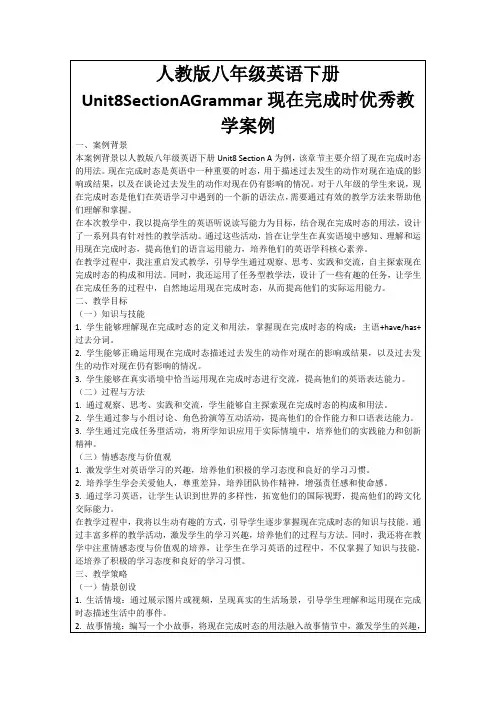
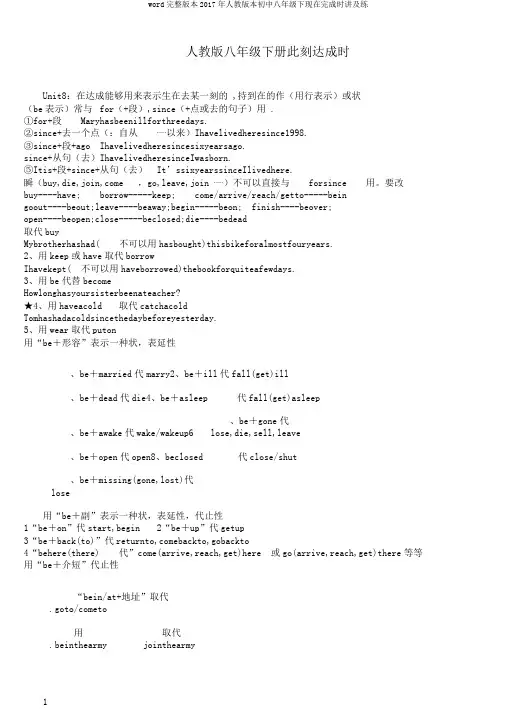
人教版八年级下册此刻达成时Unit8:在达成能够用来表示生在去某一刻的 ,持到在的作(用行表示)或状(be表示)常与for(+段),since(+点或去的句子)用 .①for+段Maryhasbeenillforthreedays.②since+去一个点(:自从⋯⋯以来)Ihavelivedheresince1998.③since+段+ago Ihavelivedheresincesixyearsago.since+从句(去)IhavelivedheresinceIwasborn.⑤Itis+段+since+从句(去)It’ssixyearssinceIlivedhere.瞬(buy,die,join,come ,go,leave,join ⋯⋯)不可以直接与forsince 用。
要改buy----have; borrow-----keep; come/arrive/reach/getto-----beingoout----beout;leave----beaway;begin-----beon; finish----beover;open----beopen;close-----beclosed;die----bedead取代buyMybrotherhashad( 不可以用hasbought)thisbikeforalmostfouryears.2、用keep或have取代borrowIhavekept( 不可以用haveborrowed)thebookforquiteafewdays.3、用be代替becomeHowlonghasyoursisterbeenateacher?★4、用haveacold 取代catchacold Tomhashadacoldsincethedaybeforeyesterday.5、用wear取代puton用“be+形容”表示一种状,表延性、be+married代marry2、be+ill代fall(get)ill、be+dead代die4、be+asleep代fall(get)asleep、be+awake代wake/wakeup6、be+gone代lose,die,sell,leave、be+open代open8、beclosed代close/shut、be+missing(gone,lost)代lose用“be+副”表示一种状,表延性,代止性1“be+on”代start,begin 2“be+up”代getup3“be+back(to)”代returnto,comebackto,gobackto4“behere(there)代”come(arrive,reach,get)here或go(arrive,reach,get)there 等等用“be+介短”代止性.“bein/at+地址”取代goto/cometo.用beinthearmy取代jointhearmy3.“bein/at+地址”取代movetoUNIT9hasgone(to),hasbeen(to),hasbeen(in) 的区2.Have/Hasgone(to): 去了(此刻不在说话现场)Whereisyourfather ?HehasgonetoShanghai.Have/Hasbeen(to): 去过(已不在去过的地方)MyfatherhasbeentoShanghai.Have/hasbeenin :呆了多久(还在所呆的地方)MyfatherhasbeeninShanghai fortwomonths ./sincetwomonthsago.此刻达成时解说一.基本构造:助动词have/has+过去分词(done)二.基本句型:否认句:主语+have/has+not+ 过去分词+其余.一般疑问句:Have/Has+主语+过去分词+其余.简单答语:Yes,主语+have/has.(一定) No,主语+haven't/hasn't.(否认)三.此刻达成时的标记此刻达成时的含义之一是过去达成的动作对此刻仍有影响,用以下四大标记词能够表达这类含义:*以already,just 和yet为标记Hehasalreadygotherhelp. 他已获得她的帮助。
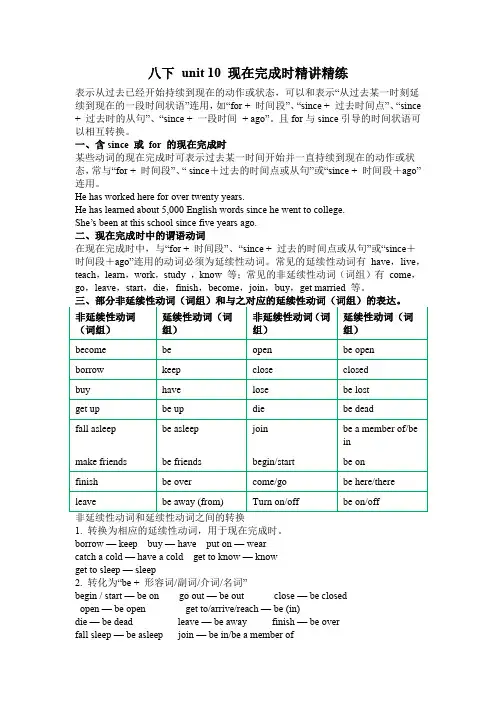
八下unit 10 现在完成时精讲精练表示从过去已经开始持续到现在的动作或状态,可以和表示“从过去某一时刻延续到现在的一段时间状语”连用,如“for + 时间段”、“since + 过去时间点”、“since + 过去时的从句”、“since + 一段时间+ ago”。
且for与since引导的时间状语可以相互转换。
一、含since 或for 的现在完成时某些动词的现在完成时可表示过去某一时间开始并一直持续到现在的动作或状态,常与“for + 时间段”、“ since+过去的时间点或从句”或“since + 时间段+ago”连用。
He has worked here for over twenty years.He has learned about 5,000 English words since he went to college.She’s been at this school since five years ago.二、现在完成时中的谓语动词在现在完成时中,与“for + 时间段”、“since + 过去的时间点或从句”或“since+时间段+ago”连用的动词必须为延续性动词。
常见的延续性动词有have,live,teach,learn,work,study ,know 等;常见的非延续性动词(词组)有come,go,leave,start,die,finish,become,join,buy,get married 等。
1. 转换为相应的延续性动词,用于现在完成时。
borrow — keep buy — have put on — wearcatch a cold — have a cold get to know — knowget to sleep — sleep2. 转化为“be + 形容词/副词/介词/名词”begin / start — be on go out — be out close — be closedopen — be open get to/arrive/reach — be (in)die — be dead leave — be away finish — be overfall sleep — be asleep join — be in/be a member ofbecome — be make friends — be friendscome/go — be + 相应的介词短语达标检测一.单项选择。
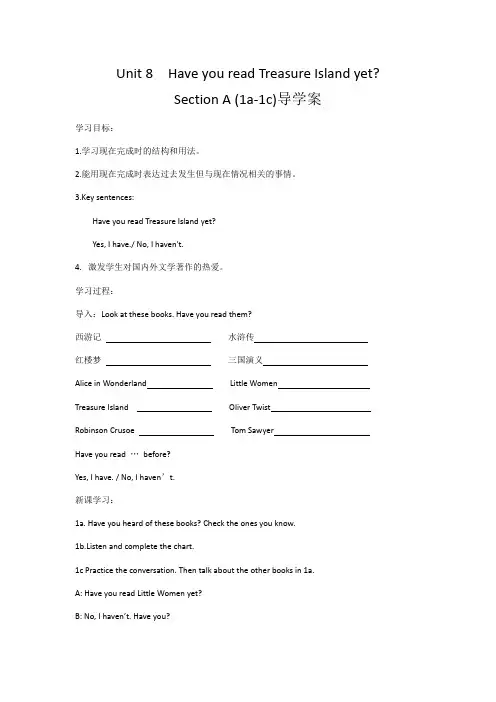
Unit 8 Have you read Treasure Island yet?Section A (1a-1c)导学案学习目标:1.学习现在完成时的结构和用法。
2.能用现在完成时表达过去发生但与现在情况相关的事情。
3.Key sentences:Have you read Treasure Island yet?Yes, I have./ No, I haven't.4.激发学生对国内外文学著作的热爱。
学习过程:导入:Look at these books. Have you read them?西游记水浒传红楼梦三国演义Alice in Wonderland Little WomenTreasure Island Oliver TwistRobinson Crusoe Tom SawyerHave you read …before?Yes, I have. / No, I haven’t.新课学习:1a. Have you heard of these books? Check the ones you know.1b.Listen and complete the chart.1c Practice the conversation. Then talk about the other books in 1a.A: Have you read Little Women yet?B: No, I haven’t. Have you?A: Yes, I have already read it.B: What’s it like?A: It’s fantastic.Do a survey in your group and then give a report.xx Have already read Little Women .He thinks it’s fantastic.课堂小结:现在完成时:1)含义:表示动作过去发生,但与现在有联系或影响,此时态常与以下时间词连用,如already已经,yet已经,还,just刚刚,ever曾经,so far到目前为止,before从前,times次数,for+时间段,since自从…以来,how long多久,never从不,in the past….在过去….2)结构:主语+have/has+动词的过去分词(have/has是助动词)肯定句:否定句:一般疑问句:当堂练习:根据汉语意思完成下列句子。
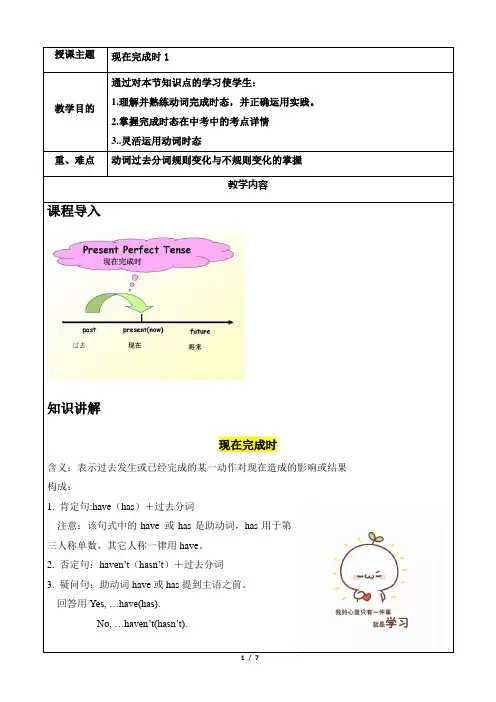
授课主题现在完成时1教学目的通过对本节知识点的学习使学生:1.理解并熟练动词完成时态,并正确运用实践。
2.掌握完成时态在中考中的考点详情3..灵活运用动词时态重、难点动词过去分词规则变化与不规则变化的掌握教学内容课程导入知识讲解现在完成时含义:表示过去发生或已经完成的某一动作对现在造成的影响或结果构成:1. 肯定句:have(has)+过去分词注意:该句式中的have 或has是助动词,has用于第三人称单数,其它人称一律用have。
2. 否定句:ha ven’t(hasn’t)+过去分词3. 疑问句:助动词have或has提到主语之前。
回答用Yes, …have(has).No, …haven’t(hasn’t).(2)表示经历的现在完成时强调过去某一时刻到说话时这段时间中的经历。
Have you ever been to the Great Wall?你去过长城吗?(3)表示延续的现在完成时表示一个动作或状态从过去某时开始,持续到现在,可能要继续下去。
He's loved fishing for a long time.他爱好钓鱼为时已久。
(他现在仍爱好钓鱼)【注意】现在完成时的“未完成”用法既可用于动态动词(主要是持续动词),也可用于状态动词,但一般不用于表短暂动作或位置转移的动词,如:open, break, go, come, arrive, leave 如用这类动词表示“未完成”,通常只限于否定结构。
I haven't seen a film for weeks.我已经好几个星期没看电影了。
3、现在完成时的时间状语(1)与现在完成时“已完成”用法连用的时间状语①不确定的过去时间状语:already, yet, before, recently, lately等I've seen the film before.我以前看过这部电影。
②频度时间状语:often, sometimes, ever, never, once, rarely等We have never heard of that.我们从未听说过这事。
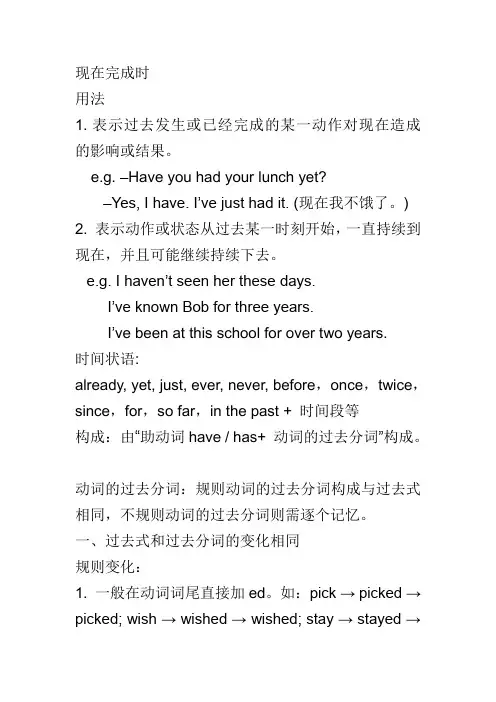
现在完成时用法1. 表示过去发生或已经完成的某一动作对现在造成的影响或结果。
e.g. –Have you had your lunch yet?–Yes, I have. I’ve just had it. (现在我不饿了。
)2. 表示动作或状态从过去某一时刻开始,一直持续到现在,并且可能继续持续下去。
e.g. I haven’t seen her these days.I’ve known Bob for three years.I’ve been at this school for over two years.时间状语:already, yet, just, ever, never, before,once,twice,since,for,so far,in the past + 时间段等构成:由“助动词have / has+ 动词的过去分词”构成。
动词的过去分词:规则动词的过去分词构成与过去式相同,不规则动词的过去分词则需逐个记忆。
一、过去式和过去分词的变化相同规则变化:1. 一般在动词词尾直接加ed。
如:p ick → picked → picked; wish → wished → wished; stay → stayed →stayed2. 以不发音的e结尾的动词后面加d。
如:like → liked → liked; hope → hoped → hoped; phone → phoned → phoned3. 以“辅音字母+ y”结尾的动词,变y为i,再加-ed。
如:study → studied → studied; hurry → hurried → hurried; reply → replied → replied4. 词尾只有一个辅音字母的重读闭音节动词,要双写辅音字母,再加-ed。
如:stop → stopped → stopped; shop—shopped—shopped;drop—dropped---dropped不规则变化:5. 以不变应万变。
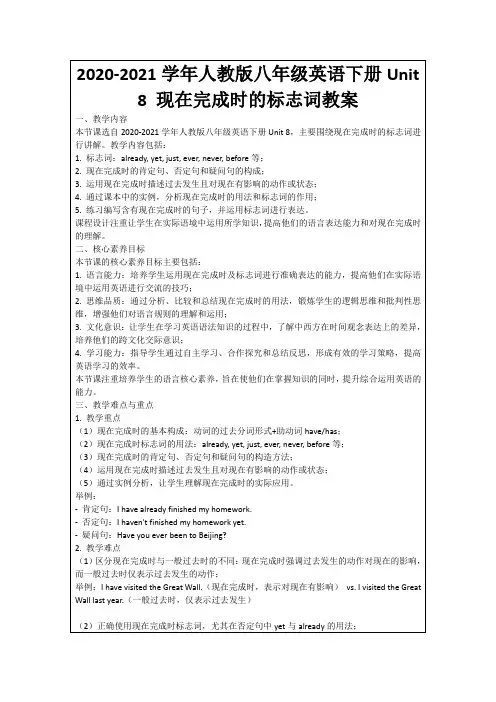
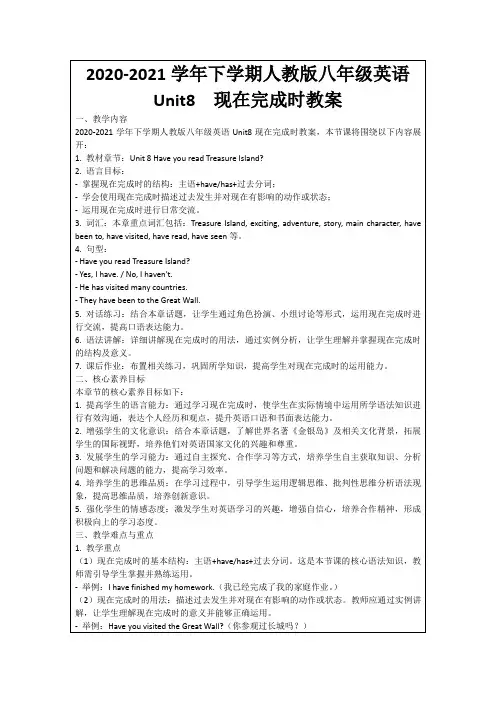
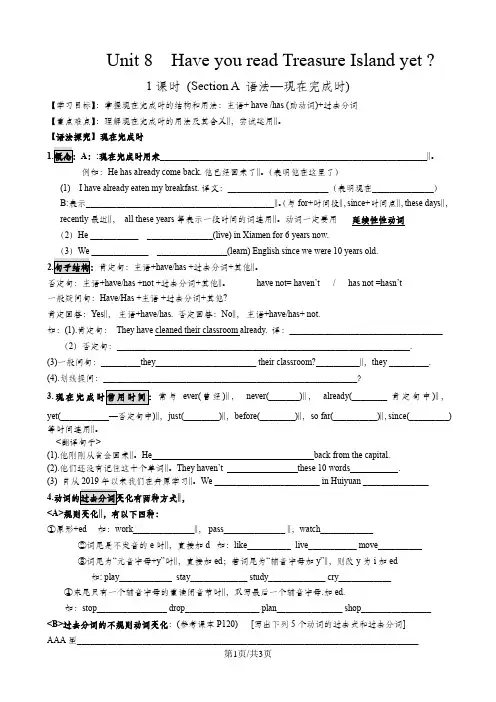
Unit 8 Have you read Treasure Island yet ?1课时(Section A 语法—现在完成时)【学习目标】:掌握现在完成时的结构和用法:主语+ have /has (助动词)+过去分词【重点难点】:理解现在完成时的用法及其含义||,尝试运用||。
【语法探究】现在完成时A::现在完成时用来_____________________________________________________________||。
例如:He has already come back.他已经回来了||。
(表明他在这里了)(1) I have already eaten my breakfast.译文:_______________________(表明现在______________)B:表示___________________________________________||。
(与for+时间段||,since+时间点||,these days||,recently最近||,all these years等表示一段时间的词连用||。
动词一定要用-----延续性性动词(2)He ___________ _______________(live) in Xiamen for 6 years now.________________(learn) English since we were 10 years old.肯定句:主语+have/has+过去分词+其他||。
否定句:主语+have/has+not+过去分词+其他||。
have not= haven’t / has not =hasn’t一般疑问句:Have/Has+主语+过去分词+其他?肯定回答:Yes||,主语+have/has. 否定回答:No||,主语+have/has+not.如:(1).肯定句:They have cleaned their classroom already. 译:___________________________________(2)否定句:___________________________________________________________________.(3)一般问句:_________they_______________________ their classroom?__________||,they _________.(4).划线提问:__________________________________________________________?3.现在完成常与ever(曾经)||,never(_______)||,already(________-肯定句中)||,yet(___________—否定句中)||,just(________)||,before(________)||,so far(__________)||,since(_________)等时间连用||。
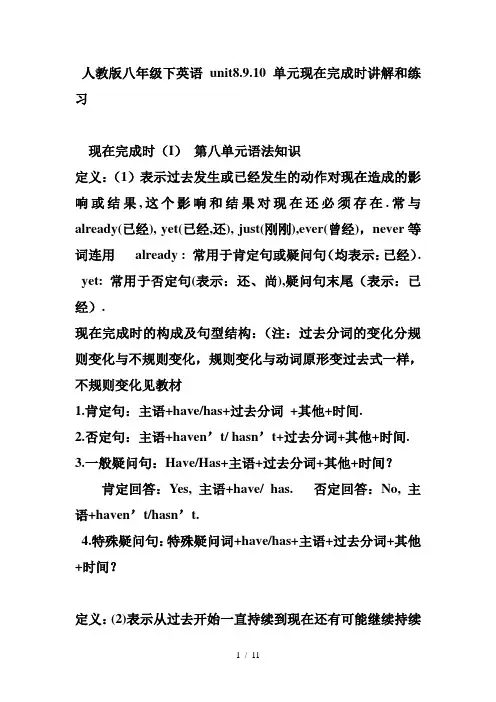
人教版八年级下英语unit8.9.10单元现在完成时讲解和练习现在完成时(I)第八单元语法知识定义:(1)表示过去发生或已经发生的动作对现在造成的影响或结果,这个影响和结果对现在还必须存在.常与already(已经), yet(已经,还), just(刚刚),ever(曾经),never等词连用already : 常用于肯定句或疑问句(均表示:已经). yet: 常用于否定句(表示:还、尚),疑问句末尾(表示:已经).现在完成时的构成及句型结构:(注:过去分词的变化分规则变化与不规则变化,规则变化与动词原形变过去式一样,不规则变化见教材1.肯定句:主语+have/has+过去分词+其他+时间.2.否定句:主语+haven’t/ hasn’t+过去分词+其他+时间.3.一般疑问句:Have/Has+主语+过去分词+其他+时间?肯定回答:Yes, 主语+have/ has. 否定回答:No, 主语+haven’t/hasn’t.4.特殊疑问句:特殊疑问词+have/has+主语+过去分词+其他+时间?定义:(2)表示从过去开始一直持续到现在还有可能继续持续下去的动作或状态。
(3) 现在完成时与一般过去时的区别:现在完成时属于现在时态的范围,不能和表示过去的时间状语连用,如yesterday,last night, three weeks ago, in2019等.一般过去时只表示过去的动作或状态,和现在不发生关系。
一般过去时可以和表示过去的时间状语连用.例题:1. _____ you ________(clean) the room? Yes, we__________(do) that already.2. When _______ you ______(do) it? We _______(do) it an hour ago.3. ______ he ______(see) this film yet? Yes, ______________4. When _____ he _____(see) it? He______ it last week.5. I _______ (read) the novel twice. It’s interesting.6. Mr. Chen _________(give)up smoking last year.7----. She _____(go) to Pairs, hasn’t she?---Yes,_______ How ____ she ____(go) there? She ____(go) there by air.现在完成时(II)第九单元语法知识1. 构成:含有be动词的现在完成时的谓语部分由“have/has+ been+ to+地点”构成,表示:曾经去过某地…(been是be的过去分词,不规则变化)2. 基本句型:(1)肯定句:主语+have/has+ been+ to+地点.(2)否定句:主语+haven’t/hasn’t+ been+ to+地点.(3)一般疑问句:Have/Has+主语+been + to+ 地点?肯定回答:Yes, 主语+ have/has. 否定回答:主语+haven’t/ hasn’t.(4)特殊疑问句:特殊疑问词+have/has+ 主语+ been?eg: Where have you been?3.用法:用来表示之前已经发生和完成度的动作与状态,其结果却和现在有联系.动作和结果发生在过去,但它的影响现在还在.可以和never, ever, once, twice, three/four…times 等副词连用.eg: They have been to Chongqing twice.I have never been to Sichuan.Has she ever been to Hainan?3. 区别:(1). have/ has been to+地点表示:曾经去过某地,已经回来了(2). have/ has gone to+地点表示:去了某地,还没有回来eg: She has been to Shanghai. (她去过上海,已经回来了)She has gone to Shanghai. (她去了上海,还没有回来)(3). have been in表示“在某地呆了多少时间”,常与时间段状语连用eg: I have been in Shanghai for three years.我到上海已有三年了。
现在完成时用法教学设计教学目标:了解并熟记现在完成时的用法会用现在完成时进行习题解答教学重点:了解并熟记现在完成时的用法会用现在完成时进行习题解答教学难点:会用现在完成时进行习题解答教学过程导入新课:讲解新课:现在完成时的用法:1表示过去发生或完成的某一动作对现在造成的影响或结果。
①Have you read that story?你读过那个故事吗?(读这一动作发生在过去,对现在造成的影响为:是否知道故事中的内容)②I have bought two apples.我买了两个苹果。
(买这一动作发生在过去对现在造成的结果是:拥有两个苹果)在学习这一概念的同时,还应注意常与现在完成时态连用的几个副词:already,just多用于肯定句中,yet,ever,never多用于疑问句和否定句中。
如:①I have already finished my homework.我已经做完家庭作业。
1.He has just had supper.他刚吃过晚饭。
2.Have you ever sung this English song?你曾唱过这首英文歌吗?3.They haven‘t done the homework yet.他们还没有做作业。
4.We have never seen a film.我们从来没有看过电影。
5.He has died.他死了。
2.表示过去开始的动作持续到现在,甚至还可能继续下去;常和表示从过去某一时刻延续到现在(包括“现在”在内)的一段时间状语连用。
如:They have lived here for ten years .他们住在这儿有十年了。
She has taught in this school for ten years .他们住在这儿有十年了。
She has taught in this school since ten years ago.短暂性动词变延续性动词:join --- 2) come ---3) borrow --- 4) buy ---5) arrive --- 6) leave ---7) begin --- 8) open ---9) close --- 10) die ---11) get up --- 12) come back---13) end--- 14) catch a cold ---15) become interested in ----课堂练习:戏剧开始了The play has begun.戏剧半小时前开始了The play began half an hour ago.戏剧开始半个小时了The play has been on for half an hour.我买了一台电脑I have bought a computer.自从我来到这里就买了一台电脑I have had a computer since I came hereC. 用have gone或have beenWhere are the boy students ?They ___________ to the school factory.Is your father in ?No, he ______________ to Shenzhen._______he ever ______ there before ?Yes, he _____________ there several times3) He asked me if I _________ to Hangzhou before.I told him that I wanted to go there for a visitas I ______ never ______ to that city before.4)My brother __________the Great Wall three times . 教学反思:。
此刻达成时 (一 )◆组成此刻达成时由“助动词 have / has +动词的过去分词”组成。
此中,动词过去分词的组成有规则组成和不规则组成两类。
规则动词过去分词的组成和其过去式的组成同样,如: return →returned,raise → raised, stop → stopped, study → studied等。
不规则动词的过去分词需要大家切记,详细拜见课本P136—P137。
【温馨提示】不规则动词的过去式和过去分词因词而异,但部分不规则动词仍可按照一些“规则”。
以下表:A-A-A 型read-read-read; cut-cut-cut; put-put-put; hurt-hurt-hurtA-B-B 型think-thought-thought; meet-met-met; tell-told-told; lose-lost-lostA-B-C 型choose-chose-chosen; go-went-gone; take-took-taken; see-saw-seenA-B-A 型run-ran-run; come-came-come◆用法此刻达成时可表示过去发生或已经达成的动作对此刻造成的影响或结果。
如:I have lost my key. (结果:所以没法进屋 )◆标记词此刻达成经常与already, yet,before, just,ever, never 等连用。
·already 意为“已经;早已”,常用于一定句中,往常放在助动词以后,行为动词从前,有时也放在句末; yet 意为“尚;还”,常用于否认句和疑问句中,往常放在句末。
含有 already 的一定句变否认句或疑问句时,要将already 变成 yet,并置于句末。
如:The rain has already stopped.→ The rain hasn’ t stopped yet.→Has the rain stopped yet?·before 意为“从前”,常放在句末。
现在完成时(一)◆构成现在完成时由“助动词have / has +动词的过去分词”构成。
其中,动词过去分词的构成有规则构成和不规则构成两类。
规则动词过去分词的构成和其过去式的构成相同,如:return→returned,raise→raised,stop→stopped,study→studied等。
不规则动词的过去分词需要大家牢记,具体参见课本P136—P137。
【温馨提示】不规则动词的过去式和过去分词因词而异,但部分不规则动词仍可遵循一些“规则”。
如下表:◆用法现在完成时可表示过去发生或已经完成的动作对现在造成的影响或结果。
如:I have lost my key. (结果:因此无法进屋)◆标志词现在完成时常与already,yet,before,just,ever,never等连用。
·already意为“已经;早已”,常用于肯定句中,通常放在助动词之后,行为动词之前,有时也放在句末;yet意为“尚;还”,常用于否定句和疑问句中,通常放在句末。
含有already的肯定句变否定句或疑问句时,要将already变为yet,并置于句末。
如:The rain has already stopped.→The rain hasn’t stopped yet.→Has the rain stopped yet?·before意为“以前”,常放在句末。
如:They have never visited the fire station before.·just意为“刚刚;刚才”,ever意为“曾;曾经”,never意为“从来没有”,它们通常放在助动词之后,行为动词之前。
如:David has just gone.Have you ever talked to him about it?I have never broken my word.◆各种句式结构·肯定句:主语+have / has+动词的过去分词(+其他).如:I have washed my car.·否定句:主语+haven’t / hasn’t+动词的过去分词(+其他). 如:I haven’t washed my car.·一般疑问句:Have / Has+主语+动词的过去分词(+其他)?肯定回答:Yes, 主语(人称代词)+have / has.否定回答:No, 主语(人称代词)+haven’t / hasn’t.如:—Have you washed your car?—Yes, I have. / No, I haven’t.现在完成时(二)have / has been to & have / has gone to◆“主语+have / has been to+地点名词”表示“某人曾经去过某地”,暗含的意思是某人现在已经回来了,不在那里了。
如:I have been to the art museum.我曾经去过那个美术博物馆。
(表示我现在不在美术博物馆,已经回来了。
)◆“主语+have / has gone to+地点名词”表示“某人已经去某地了”,暗含的意思是某人现在不在说话现场。
如:Mike has gone to London. 迈克去伦敦了。
(表示他现在还没有回来,可能在去的途中,也可能在目的地或在返回的途中。
)【温馨提示】1. have / has been to常与ever, never, once, twice, how many times等连用。
如:My sister has been to the Palace Museum twice.2. have / has gone to常用于含有sb. is out, sb. isn’t in (...)等暗含某人不在说话现场的语境中。
如:Mr. Miller is out. He has gone to the train station.3. 当have / has been to 中的to后为表示地点的副词there, here, abroad等时,to 要省略。
如:I’d like to go to the zoo, although I have been there many times.◆现在完成时的持续型用法现在完成时还可表示过去某一时间开始并一直持续到现在(包括“现在”在内)的动作或状态,该用法中的动词多是延续性动词,常见的时态标志词有since和 for。
1. since意为“自从……以来”,它既可作介词,也可作连词。
作介词时,后接表示过去的时间点,表示某事开始的时间;作连词时,引导时间状语从句,从句常用一般过去时。
如:Mr. Miller has lived here since five years ago.I have had the dictionary since I was ten.2. for作介词,后接一段时间,表示一个动作或一种状态已经持续了多长时间。
如:Miss Green has taught in the village for three years.Kate has been here for two hours.注意:1. 对since和 for引导的时间状语提问时,常用how long。
如:I have worked here for two years. (对划线部分提问)How long have you worked here?2. 在现在完成时中,含有for和since的句子可以相互转换。
如:Mary has been in Beijing for two days.=Mary has been in Beijing since two days ago.3. 在现在完成时中,表示短暂意义的动词(如come和see)在肯定句和一般疑问句中不能和表示一段时间的时间状语连用,但在否定句中是可以的。
如:Bill has come here for an hour. (×)I haven’t seen Kate for three years. (√)4. It has been / It’s +时间段+since从句(一般过去时). 表示“自从……以来,有多长时间了。
”如:It has been / It’s two years since my brother went to college.◆短暂性(短语)动词与延续性(短语)动词和与表示状态的短语之间的转化1. 有些短暂性(短语)动词可转化为相应的延续性(短语)动词。
常见的有:become → be borrow → keep buy → have / owncatch a cold → have a cold come → stayput on → wear go to sleep → sleepget to know → know move to → live in2. 有些短暂性(短语)动词可转化为表示状态的短语。
常见的有:leave → be away begin / start → be ondie → be dead finish → be overjoin → be in / be a member offall asleep → be asleep marry → be marriedcome / arrive here → be hereExercise【运用】Ⅰ. 写出下列动词的过去分词1. listen __________2. read __________3. study __________4. decide __________5. find __________6. teach __________7. write __________ 8. stop __________9. finish __________ 10. cut __________Ⅱ. 句型转换1. —Have you seen that film? (作肯定回答)—__________, __________ __________.2. —Has Susan traveled to the US? (作否定回答)—__________, __________ __________.3. My parents have visited the museum. (改为一般疑问句)__________ your parents __________ the museum?4. David has already told me the news. (改为否定句)David __________ __________ me the news __________.5. I have drunk some coffee. (加入just改写句子)I __________ __________ __________ some coffee.6. 你们曾经去过加拿大吗?__________ you __________ __________ __________ Canada?72. 我去过这个城市三次。
__________ __________ __________ the city three times.8. 我最好的朋友从未去过电影博物馆。
My best friend __________ __________ __________ __________ a film museum.9. Mr. Miller不在家,他去火车站了。
Mr. Miller isn't at home. He __________ __________ __________ the train station.10. 你父母去上海了吗?__________ your parents __________ __________ Shanghai?11. Susan has been a volunteer for protecting animals for three years.(对划线部分提问) __________ __________ has Susan been a volunteer for protecting animals?(2018 甘肃天水) 12. Mary has been in Beijing for two days. (改为同义句)Mary __________ __________ in Beijing __________ two days ago.13. The movie began two hours ago. (改为同义句)The movie __________ __________ __________ __________ two hours.14. The old man died last year. (改为同义句)The old man __________ __________ __________ __________ a year.15. I moved to the city ten years ago. (改为同义句)__________ __________ __________ ten years __________ I moved to the city.Ⅲ. 单项选择1. Sarah __________ many places of interest in Beijing already. (2018 辽宁沈阳)A. visitedB. has visitedC. will visitD. visits2. Frank hasn't heard from his brother __________. He is worried.A. stillB. alreadyC. evenD. yet3. —Have you cleaned the house __________?—No, I haven't. I'll go on to do it after a short rest.A. everB. yetC. just4. —__________ you __________ your drawing?—Not yet. I'll finish it in a few minutes.A.Will; finishB. Do; finishC. Have; finished5. —Where is your father?— He isn't at home. He __________ Zhijiang.A. has gone toB. has been toC. have been to (2018 湖南怀化)6. I __________ to the West Lake four times, but I will go there again this summer.A. have goneB. have beenC. wentD. had gone (2018 四川德阳)7. —Paris is a wonderful place.—So it is. I __________ there twice.A. have beenB. have goneC. wentD. will go (2018 四川凉山州)8. —Where is Mr. Brown?—He __________ Australia. He __________ there last year.A. has been to; has beenB. has been to; has goneC. has gone to; wentD. went; went (2018 贵州铜仁)9. —Have you ever been to South Tower Park?—Yes. I __________ there a few months ago.A. wentB. have beenC. have gone (2018 湖南郴州)10. —Lucy, is your uncle a teacher?—Yes, he is. He __________ history for nearly 20 years.A. teachesB. has taughtC. is teachingD. will teach (2018 北京)11.The film Operation Red Sea _________ a lot of praise (赞扬) since its first show months ago.A. winsB. wonC. will winD. has won (2018 上海)12. —Do you still play basketball?—Oh, no. I __________ it for the past two years.A. haven't playedB. didn't playC. won't playD. hadn't played (2018 湖北武汉)13. —What do you think of your junior high school life?—It __________ some sweet memories in my heart in the past three years.A. leaveB. leftC. has leftD. will leave(2018 云南曲靖) 14. —__________ has the 2018 World Cup been on?—For about two weeks.A. How soonB. How farC. How long (2018 海南)15. —__________ have you talked with your friends on WeChat?—Since I finished my homework.A. How farB. How oftenC. How soonD. How long (2018 山东莱芜)16.—Your new watch is so nice! When did you buy it?—In April. I __________ it for two months.A. have hadB. hadC. have boughtD. bought(2018 湖北黄冈) 17. —Are you a basketball player in your school?—Yes, I __________ the team 3 years ago. I __________ in it for 3 years.A. joined; wasB. was joined; amC. have joined; have beenD. joined; have been (2018 四川眉山)。